|
|
|
Sort Order |
|
|
|
Items / Page
|
|
|
|
|
|
|
| Srl | Item |
| 1 |
ID:
139725
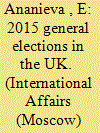

|
|
|
|
|
| Summary/Abstract |
Labour, Lib-Dems and UKIP suffered a crushing defeat, along with the analysts (me included) who had never expected that the Tories would win by a vast majority to knock together a one-party cabinet. For at least a month and a half before the elections, all public opinion polls indicated that the two leading parties were running neck and neck, so to speak with about 33-34 percent of the voters prepared to support either Labour or Tories. The aggregate rating of the smaller parties (slightly less than 70 percent) indicated that they stood a good chance to get a place in the sun.
|
|
|
|
|
|
|
|
|
|
|
|
|
|
|
|
| 2 |
ID:
144180
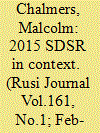

|
|
|
|
|
| Summary/Abstract |
Significant new investment in defence and security announced in the 2015 National Security Strategy and Strategic Defence and Security Review has sent positive signals about the future of the UK’s role in the world. However, argues Malcolm Chalmers, further reform and flexibility will be needed if the UK is to remain an important security player in the international arena.
|
|
|
|
|
|
|
|
|
|
|
|
|
|
|
|
| 3 |
ID:
177716


|
|
|
|
|
| Summary/Abstract |
This article explores the intimate entanglements of heteronormative power, citizenship and affect in the UK family migration visa. It pays particular attention to the material intricacies of the application process itself and the place of narration and emotional investment central to this form of government. The power of the family visa is how it is attuned to the explicit quantification and categorisation of intimate relationships on which claim to territorial rights rest. Drawing on both the analytical and methodological promise of work on ‘intimacy’ we take the family visa as a particular site for exploring our own intimate entanglement and complicity in this practice of ‘geopolitical making’- that is as both subjects and researchers of the visa. We are interested in how the visa both relies upon and produces certain forms of intimacy, particularly through processes of ‘archiving’ and the intricacies, solidarities and fragments that this is entangled with. We thus explore how we are both authors and subjects of the reproduction of heteronormative order central to visa and the drawing of borders around sanctified and unsanctified intimacy.
|
|
|
|
|
|
|
|
|
|
|
|
|
|
|
|
| 4 |
ID:
191680
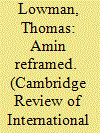

|
|
|
|
|
| Summary/Abstract |
This article explores the role of human rights discourse in reframing the changing diplomatic relationship of the United Kingdom and Uganda during Idi Amin’s dictatorship of 1971-1979. The emergence of a violent military dictatorship in Uganda in the early 1970s posed difficult questions for Britain, which had played a central role in the creation of the Ugandan nation-state in the colonial era and maintained many connections to it. In the first years of Amin’s rule the UK had adopted a pragmatic stance, in which human rights concerns were not considered, and geopolitical and economic concerns came first. However, in the mid 1970s the emergence of an energetic transnational ‘community of conscience’ contributed to a reframing of the UK’s stance on Uganda in explicit human rights terminology. This was a limited and sometimes contradictory shift that also served to obscure embarrassing aspects of the UK-Uganda relationship.
|
|
|
|
|
|
|
|
|
|
|
|
|
|
|
|
| 5 |
ID:
116883
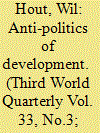

|
|
|
|
|
| Publication |
2012.
|
| Summary/Abstract |
This article discusses the attempt undertaken by several development aid agencies since the turn of the century to integrate political economy assessments into their decision making on development assistance. The article discusses three such attempts: the Drivers of Change adopted by the UK's Department for International Development, the Strategic Governance and Corruption Analysis (sgaca) developed by the Dutch Directorate General for International Cooperation and the new thinking on political economy analysis, policy reform and political risk advanced by the World Bank. On the basis of a political-economic interpretation of development agencies, two main factors are found to hinder the successful application of political economy assessment. In the first place, the agencies' professional outlook leads them to see development in primarily technical terms. In the second place, the nature of incentives for development professionals leads them to resist the implementation of political economy analyses.
|
|
|
|
|
|
|
|
|
|
|
|
|
|
|
|
| 6 |
ID:
159688
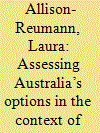

|
|
|
|
|
| Summary/Abstract |
The Brexit vote will fundamentally transform the European Union (EU) and will change how the UK relates to Europe and the rest of the world. What are the implications for Australia at this critical juncture? The UK has been a major player in the Australia–EU relationship, and Australia will now need to recalibrate its approach to both the UK and the EU across a range of policy areas. This article examines the future of Australia–UK and Australia–EU relations in the wake of Brexit, and assesses Australia’s options going forward. The authors advance three considerations. Firstly, Australia’s national interests are best served by adopting a pragmatic rather than nostalgic approach towards future relations with the UK and the EU. Secondly, Australia should avoid pursuing one relationship at the expense of the other and creating a zero-sum dynamic. Finally, Australia’s future strategy must consider broader global developments, such as events within its own region and the US presidency.
|
|
|
|
|
|
|
|
|
|
|
|
|
|
|
|
| 7 |
ID:
138740
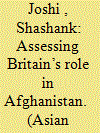

|
|
|
|
|
| Summary/Abstract |
This article assesses Britain's contemporary relationship with Afghanistan, its goals and interests there, and its possible post-2014 role. It is argued that Britain might continue to play a limited but non-negligible military, intelligence, fiscal, and diplomatic role, even as British policymakers are increasingly bound by fiscal and domestic political constraints.
|
|
|
|
|
|
|
|
|
|
|
|
|
|
|
|
| 8 |
ID:
162202
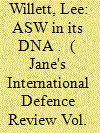

|
|
|
| 9 |
ID:
136246


|
|
|
|
|
| Summary/Abstract |
The UK׳s housing stock generates approximately 27% of the country׳s total annual carbon emissions. In light of the legally binding targets to reduce carbon emissions, new housing is subject to a tightening of regulations governing energy demand and efficiency resulting in a gradual improvement in carbon emissions. The question is how to achieve the deep carbon emission reductions from existing domestic properties, of which 75% will still be in use in 2050. Government has sought to provide incentives to homeowners to improve the energy efficiency of their households, and mandate improvements in socially rented housing using a range of fiscal measures, most recently the ‘Green Deal’. There has however been little consideration of the 18% of UK households who privately rent their home, a tenure that is growing fast. The aim of this research is to investigate the factors that influence private sector landlords when considering energy efficiency improvements to their tenanted homes. The results indicate that government policy has consistently failed to engage private sector landlords in the issue of energy efficiency and thus measures must be taken to understand the motivations of landlords in order to design effective incentives and interventions.
|
|
|
|
|
|
|
|
|
|
|
|
|
|
|
|
| 10 |
ID:
182276
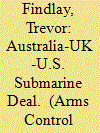

|
|
|
|
|
| Summary/Abstract |
In June 1987, Canada announced that it intended to build 10 to 12 nuclear-powered submarines, based on a French or UK design and fueled with highly enriched uranium (HEU) possibly of Canadian origin. Faced with insurmountable strategic, political, financial, logistical, and nonproliferation obstacles, the idea sank without trace within two years.1 Although the Australian nuclear-powered submarine proposal, announced 34 years later on September 16, is different in several respects, it faces equally strong headwinds that may deliver the same result.
|
|
|
|
|
|
|
|
|
|
|
|
|
|
|
|
| 11 |
ID:
182302
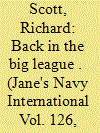

|
|
|
| 12 |
ID:
092313
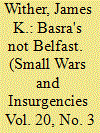

|
|
|
|
|
| Publication |
2009.
|
| Summary/Abstract |
This article examines British Army operations in Iraq. It focuses on the causes of the army's apparent failure to live up to its reputation for the conduct of small wars. The paper discusses the British experience of small wars in the context of Iraq, the influence of doctrine and strategy, and the political and moral factors that shaped the army's performance. The paper's conclusions suggest that the Iraq War may cause a significant reappraisal, not just of military doctrine and strategy, but also of Britain's role in future small wars.
* The opinions expressed in this article are those of the author and do not necessarily reflect the official policy or position of the George C. Marshall Center, the government of the United States of America or the Federal Republic of Germany.
|
|
|
|
|
|
|
|
|
|
|
|
|
|
|
|
| 13 |
ID:
150211
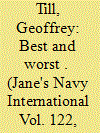

|
|
|
| 14 |
ID:
144186


|
|
|
|
|
| Summary/Abstract |
The UK appears to be making a cautious return to international policing after a decade of following an approach best described as ‘muddling through’. Recent reforms and new co-ordinating structures seek to improve coherence and promote the British model of policing abroad. These are timely initiatives as international policing is also under review at the UN. Yet what is missing – argue Stephanie Blair and Maureen Brown – is a clear, pragmatic, realistic and holistic UK government strategy for international policing and law enforcement that would provide a sense of purpose, ambition and direction, and deliver coherence across UK domestic and international security objectives.
|
|
|
|
|
|
|
|
|
|
|
|
|
|
|
|
| 15 |
ID:
148963
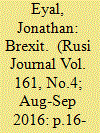

|
|
|
|
|
| Summary/Abstract |
When Britain voted on 23 June 2016 to leave the EU, the referendum result shocked many not only in the UK and its fellow EU member states but across the world. As the dust settles, the questions thrown open by this momentous decision remain. Jonathan Eyal analyses some of the most salient points that are likely to dominate the debate over the months and years ahead.
|
|
|
|
|
|
|
|
|
|
|
|
|
|
|
|
| 16 |
ID:
155424


|
|
|
|
|
| Summary/Abstract |
In this article we explore the implications of Brexit for the UK and the EU's development policies and strategic directions, focusing on the former. While it is likely that the operational process of disentangling the UK from the various development institutions of the EU will be relatively straightforward, the choices that lie ahead about whether and how to cooperate thereafter are more complex. Aid and development policy touches on a wide range of interests—security, trade, climate change, migration, gender rights, and so on. We argue that Brexit will accelerate existing trends within UK development policy, notably towards the growing priority of private sector-led economic growth strategies and blended finance tools. There are strong signals that UK aid will be cut, as successive secretaries of state appear unable to persuade a substantial section of the public and media that UK aid and development policy serves UK interests in a variety of ways.
|
|
|
|
|
|
|
|
|
|
|
|
|
|
|
|
| 17 |
ID:
145283
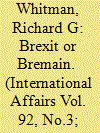

|
|
|
|
|
| Summary/Abstract |
A major public debate on the costs and benefits of the United Kingdom's membership of the European Union is presently under way. The outcome of the referendum on 23 June 2016 will be a pivotal moment in determining whether the EU has a future as a component of the UK's European diplomatic strategy or whether there is a major recalibration of how the UK relates to Europe and more widely of its role within international relations. Since accession to the European Economic Community the UK has evolved an uncodified, multipronged European diplomatic strategy. This has involved the UK seeking to reinforce its approach of shaping the security of the continent, preserving a leading diplomatic role for the UK in managing the international relations of Europe, and to maximize British trade and investment opportunities through a broadening and deepening of Europe as an economically liberal part of the global political economy. Since accession the UK's European diplomatic strategy has also been to use membership of the EU to facilitate the enhancement of its international influence, primarily as a vehicle for leveraging and amplifying broader national foreign and security policy objectives. The strategy has been consistent irrespective of which party has formed the government in the UK. Increasing domestic political difficulties with the process of European integration have now directly impacted on this European strategy with a referendum commitment. Whether a vote for a Brexit or a Bremain, the UK will be confronted with challenges for its future European strategy.
|
|
|
|
|
|
|
|
|
|
|
|
|
|
|
|
| 18 |
ID:
160618
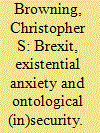

|
|
|
|
|
| Summary/Abstract |
This article explores how the Brexit Referendum on the UK's membership of the European Union has been a source of destabilisation, dread and ontological anxiety. Focusing mainly on British citizens who voted or self-identified as “Remainers”, and on EU foreign nationals resident in the UK, it shows how existential anxieties have had different points of focus for different groups of people. Confronted with such destabilising anxieties, the article shows how people have adopted different mechanisms designed to reassert a sense of order and certitude often viewed as central to preserving ontological security. The ways in which this has been done, however, can themselves raise important questions.
|
|
|
|
|
|
|
|
|
|
|
|
|
|
|
|
| 19 |
ID:
178031
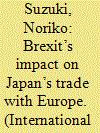

|
|
|
|
|
| Summary/Abstract |
In the context of globalization, the Japanese government emphasizes the importance of reinforcing the free trade system. Due to European Union’s (EU) reluctance, the free trade agreement (FTA) negotiations between Japan and the EU took 4 years to conclude. However, Brexit prompted the conclusion of Economic Partnership Agreement (EPA) with the EU as to maintain the economic interests of both sides after the British exit from the EU. The UK wants to maintain economic relations with Japan and to become a ‘Global Britain’ in the post-Brexit era. This article analyses both Japan–EU and Japan–UK FTAs. The core of the article looks at the impact of Brexit on Japan’s access to the European single market through a review of Japanese sectors and large corporations, particularly the automobile industry.
|
|
|
|
|
|
|
|
|
|
|
|
|
|
|
|
| 20 |
ID:
143637
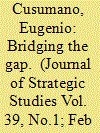

|
|
|
|
|
| Summary/Abstract |
The increasing use of private military and security companies (PMSCs) has attracted considerable scholarly attention due to its corrosive effects on US democracy. Drawing on neoclassical realism, this article provides a comparative dimension to the study of the political drivers of military privatisation by analysing contractor support to US and UK operations in Iraq and Afghanistan. Domestic political constraints have shaped both US and UK response to the need for more boots on the ground, increasing the propensity to use contractors as a force multiplier in spite of their problematic impact on military effectiveness.
|
|
|
|
|
|
|
|
|
|
|
|
|
|
|
|
|
|
|
|
|